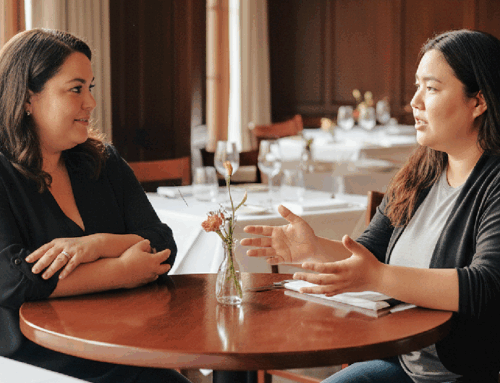Leaders are facing more uncertainty than ever before. Their teams are challenged with devising proactive solutions to thorny problems every day, which makes building trust between leaders and staff members even more paramount. Unfortunately, worrying about shortages, high turnover, and employees resisting to return to the office doesn’t help your own declining optimism for the future.
So how do you stay positive and elevate trust in your culture?
You can start lifting yourself and your team out of burnout and anxiety by having the Trust Talk with yourself. If you remember, we’ve talked about having a Trust Talk with your employees in our article “Create an Inclusive Culture Through Sincere Feedback”.
Here, we will show you how to conduct the Trust Talk with yourself to build self-trust. Feeling positive emotions is central not only to your well-being, but to your presence as an exceptional leader. When you like the core of you, you’re more flexible and willing to grow. When you have done that self-work, you can be intentional about giving the same freedom and autonomy to others. Trusting others is all about giving autonomy.
So here are the essential steps to having the Trust Talk with yourself:
1. First, recognize that you are feeling fearful and vulnerable and give yourself grace.
2. Accept the fact that you will make mistakes. Embrace imperfection and be honest with your team when you don’t know the answers.
3. Ask yourself what it is exactly that you want in the moment and what you have control over. Start working on that.
4. Affirm your strengths. Stretch into them. This will give you a creative challenge and it will boost your self-efficacy.
As with all other features of a thriving workplace – inclusion, respect, and action – we believe trust in the workplace starts with you. Once you’ve gone through the above steps and have elevated your self-trust, you will be one step closer to empowering others to do the same.
Your team takes cues from the way you act and speak, so your inner strength and confidence will catch on. Building trust is reciprocal. You must give trust in order to receive it. Trusting others sometimes feels like a huge risk. But if you believe in yourself, and if you trust that people are the heartbeat of your culture, you will be willing to take that leap.
Years ago, I took a huge leap with one of our employees, Kenny.
Kenny was one of our new hires who had recently been released from prison after serving a 12-year sentence for a crime he committed when he was 19. He had been looking for employment unsuccessfully and was thought he would never find a job that would support his family.
I took a risk and hired Kenny and coached him one-on-one. He became one of our most loyal and engaged employees. We promoted him multiple times. He stayed with us for over five years. During that time, he developed self-confidence, started his own business, and he and his wife were able to buy their first home. I experienced firsthand what a powerful impact trust and intentional inclusion could have not only on our business but also in your employee’s life.
However, taking the trust leap with Kenny was possible because I’ve created internal space where self-trust, growth and confidence can thrive.
When you allow others to exercise their expertise and autonomy, your team’s engagement, productivity, and creativity will grow. By empowering other people, you will be building an inclusive culture together where progress is the norm, not the exception.
Of course, people will make mistakes. You can navigate them by holding regular sincere feedback sessions. The more you trust people, the more they will take responsibility and ownership of their own continuous improvement.
When people feel trusted to move their own work forward, you will see those same people feel responsible for correcting their own mistakes.
To strengthen trust in your culture, start here:
1. Acknowledge people’s fear and vulnerabilities, let them know they are seen and treat them with compassion.
2. Accept the fact that they will make mistakes and convey to them that mistakes are opportunities to grow.
3. Define what’s in your (and theirs) control and work on that.
4. Ask them what they need and give it to them.
5. Involve people in the decisions that affect their jobs and their lives.
Taking risks with others is possible if you take the bravest risks of all–trusting yourself.
For help in getting 100% clear on how to instill trust in the workplace, schedule a call with me here: https://lnkd.in/gyWcS8SB








